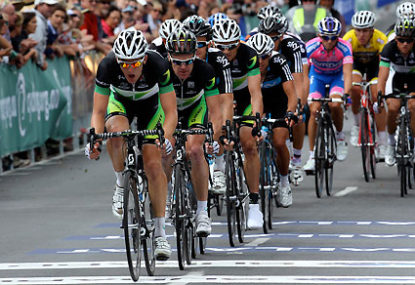'I've just won a stage of the Tour de France, mate!': Hindley grabs yellow jersey as Aussie blows Tour apart
Australia's Jai Hindley has said he is "lost for words" after a shock stage victory at the Tour de France earned him the leader's…

Australian cycling reached the summit with Cadel Evans’ win in the 2011 Tour de France – our country’s first in the grandest grand tour. But 2012 is the year in which the sport’s growth in this country could be cemented for generations to come.
There is no doubt Evans’ victory combined with the growth of Adelaide’s Tour Down Under has helped cycling reach a new level of public consciousness within Australia.
Evans’ Tour de France success broke through a mainstream Australia that usually treats international sports with suspicion compared to its homegrown codes. And that growing popularity is reflected on our roads.
Cycling, in many ways, has truly become the new golf; a participatory sport that can be followed from your couch and mimicked in your leisure time – more fitting for an increasingly fitness-conscious society than a lazy day on the golf course.
It’s hard to ignore the growing number of peletons on our public roads, and the fact that its appeal isn’t restricted to a specific generation or demographic.
The Tour Down Under Community Challenge, allowing the public to ride on the same stage as the pros, is perhaps the best activation of this growing interest and syncing it with the sport itself.
Lance Armstrong coming out of retirement and going into retirement (again) at the Tour Down Under undoubtedly gave the event and Australian cycling a significant boost, but the Tour de France and other grand tours and classics have been growing in profile at a noticeable rate, thanks, in large part to SBS’s fantastic coverage of the sport.
Channel Nine grabbing the television rights for the Tour Down Under from SBS highlights this growing appeal, increasing mainstream awareness.
So, with Evans sitting at the top of the sport and as the first non-European country to host a leg of the UCI ProTour, Australian cycling now boasts a professional team on the world tour; GreenEDGE, designed to develop and aide Australian cyclists while representing the country on a global stage at tours, classics and more.
Cycling, which, we were told, once only appealed to the multicultural side of Australia that enjoys the internationalism of the sport, now has a representative team that can appeal to the Mia Freedman-types who struggle to grasp its international scope (how dare Cadel Evans live outside of Australia?).
But more importantly, GreenEDGE can be the vehicle to foster and develop Australian talent on the world stage, providing a platform to solidify the growing number of professional cyclists and the more that will follow as a result of Evans’ achievements.
Even if Evans is unable to defend his Le Tour title and fades into the background, there are a number of talented young Aussies waiting in the wings with the potential to rise to the fore of the sport – Richie Porte, Matthew Goss, Jack Bobridge, Cameron Meyer, Michael Matthews to name but a few.
There is a whole new generation following in the footsteps of Evans, Stuart O’Grady, Robbie McEwen, Michael Rogers, dwarfing them in terms of sheer numbers.
This is the advantage Australia now has in cycling compared to other international sports such as football, tennis, basketball, motorsport etc; there’s depth in numbers.
And unlike those other sports, there is a direct path to the upper professional echelon of the sport specifically designed to cater for Australians.
GreenEDGE could be the difference that separates cycling from these other sports – the equivalent of an Australian-owned Formula One team running Mark Webber and Daniel Ricciardo while concurrently grooming their successors.
The irony is this Australian boom comes at a time when cycling’s international status remains clouded by the cases hanging over Alberto Contador and Armstrong, in particular, and with pro teams in the sport’s European heartland either folding or merging as sponsorship dries up and isn’t adequately replaced.
Perhaps the true test of Australian cycling will be whether GreenEDGE can find sponsorship and funding in this difficult climate solely from Australia, or whether it has to erode its Australianness with international sponsors.
Nevertheless, the foundation is now there for further growth, should GreenEDGE survive and prosper.
If 2011 was the year Australian cycling reached the summit, 2012 could be the year it guaranteed it stays there.